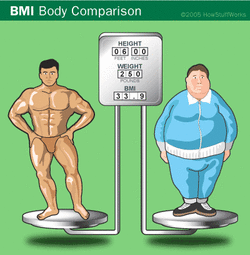Actually, BMI is a pretty unreliable way to assess an individual's health, and for health professionals using it on an individual basis, it can do more harm than good.
The BMI is a measure of height and weight - specifically weight divided by height squared. It is the main measure used by dietitians, health professionals and governments to determine what is and is not a “healthy weight” for an individual.
As a student dietitian I was taught to use BMI to inform patients if they are “at risk” for morbidity and premature mortality. In reality, however, BMI is not only not a good measure of health, it is actually not a measure of health at all.
As yet another mathematician Keith Devlin recently commented, “the absurdity of using statistical formulas to make any claims about a single individual is made clear by the old joke about the man who had his head in the refrigerator and his feet in the fire: on the average he felt fine!” A funny expose of the inherent mathematical absurdities associated with the use of this formula can be found in Dr. Devlin’s article Do You Believe in Fairies, Unicorns or the BMI?
Here's four big reasons why BMI isn't a reliable assessment tool I'll be using on my clients any time soon.
1. BMI does not distinguish fat mass and muscle mass.
Under the BMI measure, Arnold Schwarzenegger is obese (with a BMI of around 41, last time I heard - far beyond the acceptable healthy BMI range of 18.5-25). BMI is a measure of relative weight; fat mass and muscle mass are not distinguished. The number of times I've spoken to otherwise healthy and fit people who've been told by their doctors to lose 5-10kg just to get into the healthy BMI range is crazy!
2. BMI misidentifies those who need health intervention.
A recent US government survey indicated that over half the “overweight” adults (51.3%) being targeted for medical intervention based on their weight are metabolically healthy, and one in four “normal weight” (23.5%) metabolically unhealthy adults are overlooked (9). This wastes taxpayers' money and suggests 1 in 5 people who actually need help are being overlooked. I've personally spoken to people whose diabetes were not diagnosed until they were in more advanced (and therefore dangerous) stages of the disease because they had always been normal or even "underweight"! Clearly, using BMI as an indicator for health misidentifies those who need intervention.
3. BMI can stigmatise naturally lean people.
Similarly people classified as "underweight" who are naturally slim and otherwise strong and healthy can get confused when told they need to put on weight in order to be healthy, or worse still, told they are anorexic. Again, putting on weight to reach a desirable number is unnecessary, unless someone is at serious risk of nutrient deficiency or they have an eating disorder that is forcing them below their most healthy, natural and comfortable weight range.
4. BMI and weight are poor indicators of health.
There is now considerable scientific evidence establishing that weight and BMI are poor predictors of disease and longevity (1,2,3,4,5). Multiple studies are suggesting that a focus on weight as a health criterion is often misdirected and harmful. (6,7,8). There are a number of scientitfically validated approaches that are becoming increasing popular, because they focus on the empirically-validated factors that are associated with health and longevity, for people across the weight spectrum (9). The HAES® approach (Health at Every Size) is one of these.

BMI is certainly a crude and misleading measurement for body builders and the naturally slim. On an individual basis, the greater focus should be on healthy behaviours: physical activity and a healthy diet.
Use BMI if you must, but understand its limitations, and use it in conjunction with blood chemistry, accurate self-assessment, lifestyle behaviours, and more subjective measures of health including overall stress, and how peaceful and grounded you feel.
Don't pay undue attention to numbers and equations. Get out of your head and into your body. Enjoy life, eat to your appetite and trust and love your body!
Love and green leafies,
Casey
Holistic Dietitian & Nutritionist
References
- Gaesser, G. (2002) Big Fat Lies: The Truth About Your Weight & Your Health. Carlsbad, CA: Gurze.
- Flegal, KM et al. (2005). Excess deaths associated with underweight, overweight, and obesity. JAMA, 293(15) 1861-1867.
- Flegal, KM, Graubard, BI, Williamson, DF, Gail, MF (2007). Cause-specific excess deaths associated with underweight, overweight, and obesity. JAMA, 298(17), 2028-3037.
- Orpan HM, et al. (2009). BMI and mortality: Results from a national longitudinal study of Canadian adults. Obesity, doi:10.1038/oby.2009.191
- Tamakoshi1 A, et al. (2009). BMI and all-cause mortality among Japanese older adults: Findings from the Japan collaborative cohort study. Obesity, doi:10.1038/oby.2009.190
- Kang X, et al. Impact of body mass index on cardiac mortality in patients with known or suspected coronary artery disease undergoing myocardial perfusion single-photon emission computed tomography. J Amer Coll Card, 2006; 47(7):1418-26.
- Oreopoulos, A et al., Body mass index and mortality in heart failure: A meta-analysis. Amer Heart J,; 2008; 156:1, 13-22.
- Olsen, TS, et al., Body mass index and poststroke mortality, Neuroepidemiology 2008; 30:93-100
- https://www.sizediversityandhealth.org/index.asp


































 RSS Feed
RSS Feed



